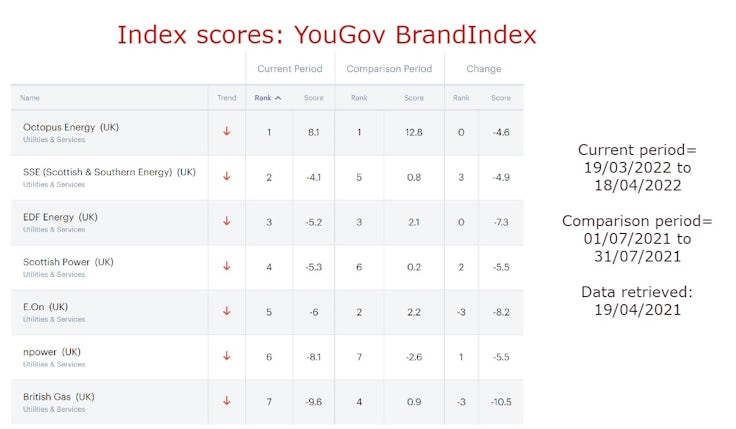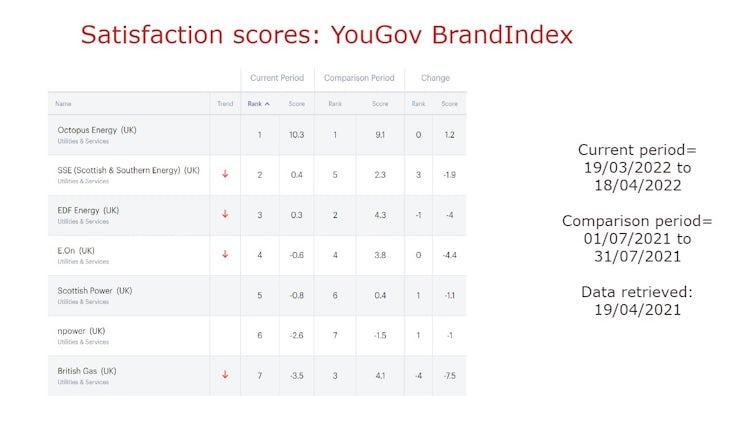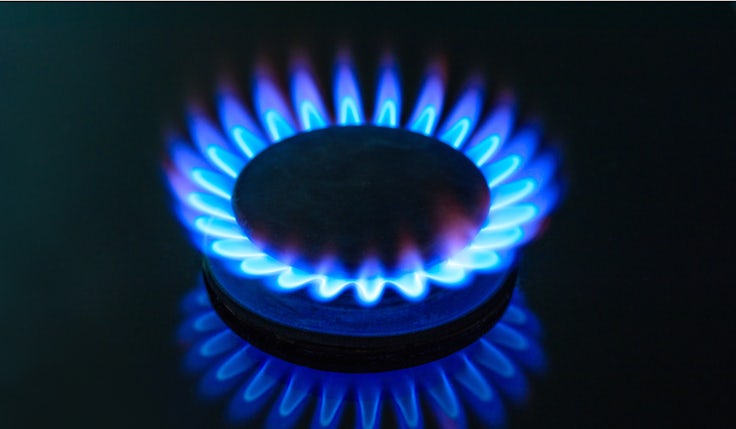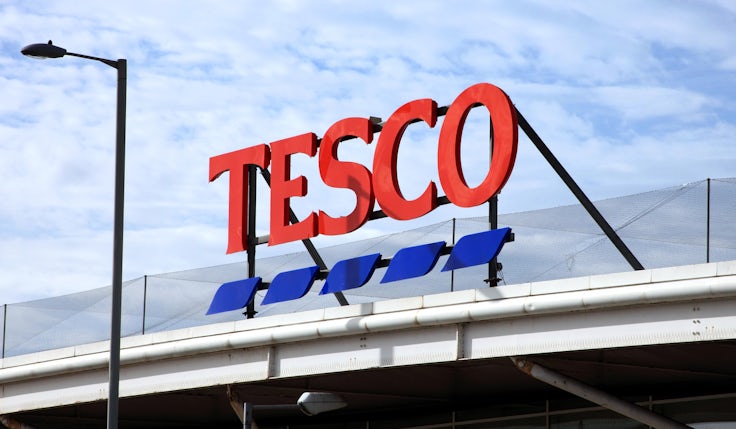Energy firms see brand health tumble amid ‘deteriorating’ customer service
All of the ‘Big Six’ energy companies, plus up-and-comer Octopus Energy, have seen the health of their brands take a hit since the onset of the energy crisis more than six months ago.

The energy sector is currently facing its most challenging period in decades, with geopolitical crises and inflating prices leading to a difficult operating environment for those suppliers still staying afloat.
To add to concerns, this week Ofgem cautioned energy firms over “bad practices” and “troubling signs” that some have reacted to the disruption in the market by “allowing levels of customer service to deteriorate”.
Indeed, according to YouGov’s BrandIndex tool, all of the ‘Big Six’ energy companies, plus up-and-comer Octopus Energy, have seen the health of their brands take a hit since the onset of the energy crisis more than six months ago.
British Gas, E.On, Scottish Power, SSE, EDF energy, Npower and Octopus have all seen their index scores fall significantly since July last year, when energy companies began to go bust amid soaring wholesale prices. The index score is a measure of total brand health using an average of a brand’s impression, value, quality, reputation, satisfaction and recommend scores.
Octopus, a relatively young energy company, has historically claimed a higher index score than its larger rivals. However, the brand’s index score has now dropped from 12.8 in July 2021 to 8.1 in April, a four point decline.
Meanwhile, British Gas’ index score saw a decline of over 10 points over the same period, although from a much lower base. It now claims an index score of -9.6, down from 0.9.
This is despite these two brands having been identified through YouGov and Brand Finance data in September as the companies best positioned to grow whilst the sector underwent a period of consolidation. Since the start of 2021 more than 30 energy companies have gone bust, with their customers absorbed by other firms. British Gas and Octopus adopted the most customers over that period, at 500,000 and 580,000 customers, respectively.
The remaining companies in the Big Six have also seen their brand health drop. These firms have traditionally been the biggest companies in the sector. However, Npower has been acquired by E.On, and SSE’s energy supply business has been bought by challenger brand OVO. Both brands continue to operate despite the takeovers.

In terms of overall brand index score, EDF and SSE are doing the best out of the Big Six companies. SSE has a score of -4.1, representing a five point drop from July 2021. EDF has a score of -5.2, from a score of 2.1 in July.
After British Gas, E.On is the energy company that saw the biggest drop, with its index score dropping over eight points.
Scottish Power and Npower have both seen their scores drop 5.5 points since the sector consolidation ramped up. Scottish Power’s index score in the last month was -5.3, compared to the figure of 0.2 in July. Npower has the second-lowest overall index score after British Gas, at -8.1. This represents a decline from -2.6 in 2021.
In July 2021, all of the Big Six energy companies except Npower had overall index scores that were in positive figures. By contrast, across the last month, all of these scores are now in minus territory.
But although the big energy companies have experienced an almost universal decline in brand health, one point of variation is in satisfaction scores.
British Gas saw a seven point drop in its satisfaction scores from before the energy crisis began to now. It plunged from 4.1 in July to -3.5 in the month to 18 April 2022.
E.On and Scottish Power have both fallen into negative figures from a positive score in July – the companies now have a score of -0.6 and -0.8 respectively. Npower already had a negative score of -1.5 in July 2021, but this has dropped further to -2.6.
SSE and EDF have both managed to retain satisfaction scores in the plus figures, at 0.4 and 0.3 respectively. However, this is a still a drop for both companies. EDF has seen a particular sharp drop, with a four point score change from July 2021.
However, Octopus Energy managed to achieve a rise in its BrandIndex satisfaction score over the period.
In the month to 18 April 2022, its satisfaction score was 10.3, a 1.2 increase on July 2021 when that score was 9.1. It also has a higher overall score on satisfaction than any of its larger rivals.

Energy companies respond to Ofgem
At a time when supply-chain pressures are triggering price rises across the board, customer experience can be a crucial differentiation between energy companies.
However, in a blog post last week, energy watchdog Ofgem’s CEO Jonathan Brearley laid out concerns that customers are being directed towards tariffs that may not be in their best interests, that suppliers may be increasing direct debit payments by “more than is necessary”, and that vulnerable customers may be being mistreated when they fall into difficulties.
Brearley warned energy firms Ofgem would hold them to account if changes were not made, and “take tough and decisive action using the full range of regulatory tools at our disposal, including punitive measures if necessary”.
Octopus Energy: Customer experience is not just a job for marketing
On 19 April, CEOs from four energy suppliers gave evidence to the House of Commons Business, Energy and Industrial Strategy Committee. The companies present were asked about customer service, and how they are looking after customers at a time when the cost of living crisis means many are worried about affording their energy bills.
Chris O’Shea, CEO of Centrica, the parent company of British Gas, admitted the company’s customer service has been “under pressure” as millions of customers have been forced to change supplier as companies go bust.
“The several million customers that haven’t had to move supplier, they read the paper and they get concerned, so it’s increased their propensity to call,” he said.
Ofgem’s Brearley said the current crisis should be viewed by energy companies as an opportunity to make changes. “The challenges that our customers face today should be a call to action for energy retailers to improve things,” he said.
Indeed, the companies which gave evidence to MPs cited a number of ways they were working to improve customer service, such as increasing the number of customer advisors available and investing in innovation to expand the ways in which consumers could reach them.
The challenges that our customers face today should be a call to action for energy retailers to improve things
Jonathan Brearley, Ofgem
Michael Lewis, CEO of E.On, said the company had adopted “the universal agent model, where when you call you only talk to one person and they can answer all queries in order to drive a better customer experience.”
Lewis claimed the company has “seen an improvement overall in the customer experience”, citing improving Trustpilot ratings as evidence.
During the session, EDF’s CEO Simone Rossi said the company had taken on 20% more customers due to failed suppliers.
Rossi also claimed that that service levels had “fallen across the industry”, citing figures from Citizens Advice.
These figures from March 2022 find that small energy supplier M&S Energy has the best customer service score, achieving 3.85 stars out of 5.0. EDF follows with a marginal difference. The third best scoring energy supplier in terms of customer service according to the Citizens Advice ranking is Octopus.
A spokesperson for EDF told Marketing Week it “welcome[s] Ofgem’s actions to tackle poor practice in the energy retail sector”.







